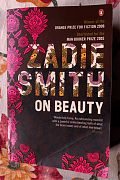
Zadie Smith
On Beauty
Nine years ago I read Zadie Smith in a concrete hotel room in Douz, Tunisia. The weather was cold and rainy and since I knew no one, I finished White Teeth in a few days. My impressions of that novel so acclaimed in every literary corner, was that it was weak. My impression could have been influenced by my loneliness, by my over-inflated will that was getting me through the country and by the fact that the novel I finished before was Dostoevsky’s The Idiot. Stepping from 19th century Russia into 20th century England was rough.
So when I read an interesting interview with Zadie Smith last month, during my research on writers who have lived in Rome, I decided I would give her another try. And I’m happy I did. On Beauty is a delightful novel that confronts many of our most human dilemmas. One element I enjoyed was that the story centered around a family, one whole big family, which is something that contemporary literature steers clear from. Maybe that’s because families have been written about so often in the past or because the narratives are as diffuse as they are close, making the combination complicated.
And each one of the Belseys is very different. Though they are all influenced by their academic surroundings, some making their decisions against it and some making their decisions towards. Their situation is further complicated by being mixed race, Kiki the mom is black while Howard is an English white guy. Levi illustrates best what it is like to be caught between these two worlds, denying his middle-class up-bringing in order to be more of a brother. But what I’m interested in is the confrontation of academic ideals with the world, best depicted by Howard and Zora, his daughter, and their clashes with the “beautiful” Victoria Kipps.
It is in relation to Victoria that Smith uses the word “beautiful” the most, and since this book is “on beauty,” that is a word to pay attention to. Kiki was also beautiful when she was young; the reader is made to believe that she would have made good competition against the younger woman. And in fact, through Howard, they do. But it is Zora who is Victoria’s opposite, in looks and an ignorance of what those looks can entail. Zora’s ideals are as innocent as they are intellectual; she knows little about the physical place where the mind fails. While Victoria resides there, not because she is beautiful but because she knows what to do with it.
Here’s Kiki yelling at Howard:
I’m so sorry your dick offends your intellectual sensibilities. It must be terrible. There’s your subtle, wonderful, intricate brain and all the time it turns out your dick is a vulgar, stupid little prick.
Just as Victoria’s over-sexed yet emotional childishness is a part of contemporary growing up, so is Zora’s symptoms of the opposite. Some pages later, Claire Malcolm thinks:
As Dr Byford explained, she was really the victim of a vicious, peculiarly female psychological disorder: she felt one thing and did another. She was a stranger to herself. And were they still like that, she wondered—these new girls, this new generation? Did they still feel one thing and do another? Did they still only want to be wanted? Were they still objects of desire instead of—as Howard might put it—desiring subjects?
In this sense, Kiki is the heroine of the book. Kiki who cleans up all the rest of the female characters by being true to herself. Kiki who is the strongest and most diverse character, who penetrates the novel imperviously. Howard is an empty sack in comparison, all her children are attachments and Victoria is reduced to meaningless rubble.
Now, I’m interested in what White Teeth was about.
· · · · · · · · · · · · · · · · · · · ·